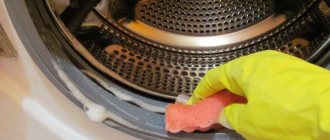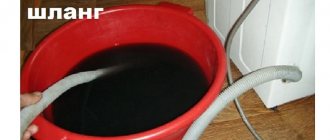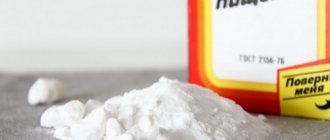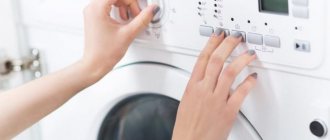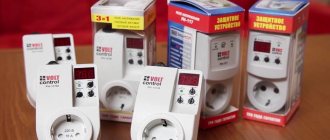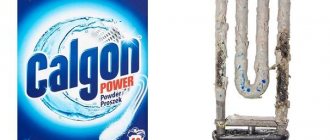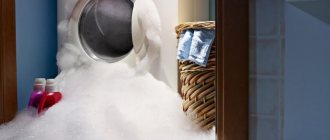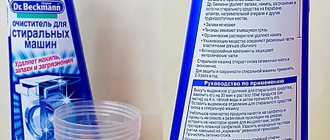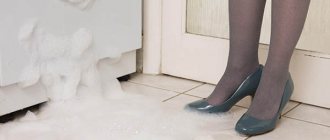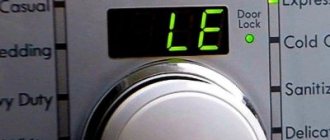Do I need to soften the water for washing?
Washing machines need regular cleaning. Hard water is the cause of plaque on machine elements located in a humid environment. How to understand what kind of water is in your water supply? If you do not resort to any special determination methods, the following will be intensively formed in the machine:
- Scale;
- Soap scum;
- Unpleasant smell.
If these signs appear, you should consider softeners. By making the water softer, you can extend the life of your washing machine and improve the quality of washing.
Traditional methods of water softening
For washing in a washing machine, the water can be softened using laundry soap. Place a bar of soap in a nylon stocking in the washing machine and fill with warm water. Start the wash and stop after three minutes. Take out the stocking and remove any soap flakes that appear from the water. Now you can wash it, the water in the washing machine has softened. The method is well suited for conventional washing machines, and not for automatic ones; for them, people have come up with another method that is easy to implement at home.
You can soften water and clean your washing machine with soda ash, which gives good results and is affordable. It is necessary to add soda to the detergent dispenser along with the washing powder. If you have tap water with a high level of hardness, then add soda ash in the same amount as washing powder. For water of medium hardness - half the amount of powder.
By the way, we suggest you learn how to determine water hardness at home.
What is hardness?
This indicator is determined by the concentration of calcium and magnesium salts dissolved in water. When boiled, they, or rather, part of them, are transformed into a sediment - scale. You can observe this process in any kettle for boiling water. From the value assigned to the technical fluid that flows through water pipes:
- Soft;
- Normal;
- Moderately hard;
- Very tough.
Washing in conditions of high rigidity negatively affects the fabric and requires increased consumption of detergents.
After washing, the fabric turns yellow and becomes rough - magnesium and calcium soap settles on it. Due to the uneven wetting characteristic of hard water, the fabric sheds unevenly. After several such washes, the item becomes unusable.
Benefits of washing in soft water
By taking care to soften the water for your washing machine, a positive result will be noticeable immediately. The quality of washing will increase, and white laundry will no longer acquire a grayish tint. In addition, you will protect your equipment from the appearance of plaque and unpleasant odors, which lead to the need to clean the washing machine from scale and mold.
Taking measures to soften water causes additional actions and leads to certain costs, which are subsequently justified. The consumption of detergents will be reduced, since the powder dissolves less easily in hard water. Also, you will have to clean the washing machine less often, which will make operating the equipment easier.
By deciding how to soften the water for a washing machine, you can significantly increase its service life. The considered methods are enough to choose the most suitable one for use at home.
How to determine hardness?
The easiest way is to use a special card. You can also use a conductometer - this is a device for measuring electrical conductivity. It is also called a “salt meter”. The higher the number on the screen, the more salts and harder the liquid. What signs can be used to judge an increased concentration of salts:
- Detergents do not foam well;
- Scale forms in the kettle after just a few boils;
- Bitter taste - however, not everyone feels it;
- The formation of a white coating on the walls of the container after settling.
How to soften well water
The water in the well is not always of good quality; often the content of salt impurities and metals exceeds the norm. How to make such water suitable for household needs, bathing and cooking? Apply one of these methods:
- Boiling. When exposed to high temperatures for 40–60 minutes, most substances decompose, and the remaining elements settle to the bottom of the container as a result of subsequent settling. This water is suitable for drinking, cooking and bathing.
- Advocacy. This method is used in cases where it is necessary to water indoor flowers and crops in the garden. As a rule, owners of private houses take water from a well for this purpose. A large container is filled with water, which must stand for at least 24 hours.
- Freezing. It is better to partially freeze water by filling it in a plastic bottle and placing it in the freezer. When an ice crust forms near the walls of the vessel, the unfrozen water is poured out and the ice is left to thaw. Melt water is suitable for drinking and watering plants.
- Mixing. You can reduce hardness by mixing water from a well with soft, purchased or melt water.
- Silicon. Minerals are washed in running water and placed in a container. Then water is poured into the vessel and covered with a cloth. You need to stand for at least 2-3 days.
Cleaning water can be softened with soda ash or ammonia. This will help neutralize salts and increase the amount of suds from detergents.
What should the water hardness be?
It is measured in degrees of hardness, volume fractions or mass number. The officially accepted unit of measurement (SI system) is mol/m³. In fact, another unit of measurement is more often used - milliequivalent/liter. Water is distinguished, mEq/l:
- Soft - less than 2;
- Normal - 2-4;
- Hard - 4-6;
- Very hard - 6 and above.
Three types are distinguished by degrees of hardness:
- Soft - less than 2;
- Average - 2-10;
- Very hard - more than 10.
In Russia, unfortunately, the norm is considered to be 7 mEq/L. In Europe, this figure is 1-2 mg-eq/l. That is, liquid flows through our pipes, which needs to be softened.
How to soften water for watering indoor plants
Salts and metals contained in hard will are harmful to plants. How to soften water for watering flowers?
- You can use settled and melt water, and also use liquid purified with silicon.
- The water is also softened with peat. You will need to prepare a solution in the proportion of 100 grams of peat per 10 liters of water, stir thoroughly and water the plants.
- In addition, to prepare a solution for irrigation, add wood ash (30 g per 10 liters of water). The ingredient is dissolved and allowed to brew for an hour, and then the plants are watered.
How to soften water?
There are two categories of ways to make hard water soft at home - mechanical and chemical. Let's take a closer look at them.
Chemical methods
- Softening agents. The most popular in Russia is “Kalgon 2 in 1”. With its help you can protect heating elements, drums, and plastic hoses from scale. The dosage depends on the concentration of salts. Leading European manufacturers recommend using Calgon. True, it itself does not remove scale - it only prevents its formation, providing a softening effect. It does not guarantee complete protection of the washing machine.
- Special washing powders. They contain softeners. These are Persil, Ariel and others powders. They can extend the life of the machine quite well.
Mechanical methods
To increase softness, various systems are used that can handle large volumes of liquid. They are connected directly to the water supply. There are:
- Membrane filter. They are also called reverse osmosis systems. Water passes through them under pressure. It overcomes the membrane that traps molecules of all substances. The membrane only allows water molecules to pass through. Such filters are used only for household needs, as they also remove substances that are important for the body.
- Magnetic softener. They are installed on highways and water pipes. Salt dissolved in the liquid, under the influence of a magnetic field, enters the sump. An electromagnetic softener works in a similar way - in it the salts are affected by the electromagnetic field.
- Ion exchange systems. They cope with any tasks. One reagent is an ion exchange resin, the second is a saline solution. They are separated - they are in different containers. These high-performance systems are easy to maintain. The disadvantage is that the reagents need to be changed periodically.
- Salt filter. Cheap and accessible. The reagent is polyphosphate crystals. It improves the quality of washing quite well.
How to soften water in a washing machine?
Special products designed to effectively soften hard water in a washing machine are offered by users and specialists. Traditional methods, chemical products and special devices protect household appliances from plaque and deposits.
Traditional methods of water softening
Users offer several options for reducing water hardness. And they all work!
Soda ash + washing powder
Soda in the amount of 1 tsp. Add to measuring cup of powder. This water is good for removing stains from dense materials.
Important! If there is an excess of soda ash, the fibers of natural fabric are destroyed.
Laundry soap
You will need 150 g of shavings from this product. It is dissolved in 5 liters of water in the evening. The composition is poured into a large tank and infused until the morning. You need to drain the washing gel without sediment, and then add 2-3 tsp to it. boric acid.
Important! The product should not be used on children's clothing - laundry soap is not suitable for delicate skin.
Wood ash
To soften water, you can use 2.5 g of ash per 1 liter of water. The components are thoroughly mixed and infused for 8-12 hours.
Advice! It is best to use ash from sunflower, corn, beech and oak.
Lemon acid
You will need 80 g of citric acid, which is poured into the drum. Select a 95 degree program - things become soft and stains are removed better.
Wood ash
Lemon acid
Soda Ash
Laundry soap
Gargling in a bite
1 tbsp. The product is added during the rinse program. Vinegar neutralizes residual calcium-magnesium salts.
Washing powder + laundry soap
For 1 liter of water you will need 3 g of soap, which is mixed with a measuring spoon of powder. The solution is allowed to settle overnight and then used for washing.
Salt tablets
1 tablet of salt can be used to remove scale or soften water. It is thrown into the drum, and washing is done without laundry.
“Cold” method of water softening
A folk method that is recommended to be used exclusively for hand washing. You will need:
- Fill half of a large tank or metal tub with water.
- Leave the water outside for 1 week in the shade.
- Check for sediment at the bottom.
- Carefully drain the water without sediment.
Important! Alkaline earth metal salts lose activity at low temperatures, so the water will be very soft.
Use of chemicals
How can you soften hard water in a household washing machine if there is no trust in traditional methods? It is worth using chemical products:
- Calgon 2-in-1. The gel composition will 100% protect the drum, heating element and plastic pipes, but will perfectly soften the water and prevent scale from forming;
- washing powders with a softening effect. Used in dosages strictly specified by the manufacturer;
- Doctor TEN. Multifunctional product in powder form. Removes scale, detergent residues, odors, softens water.
Interesting to know! Brands Whirlpool, Bosch, Siemens recommend only Calgon softener for their household appliances.
Applying filters
Modern manufacturers install an anti-scale filter for automatic washing machines. The mesh element is located at the junction of the water intake hose with the housing. It does not prevent the access of small particles, but it prevents rust from getting into the water. It is more advisable to use additional systems.
Salt (polyphosphate) devices
Polyphosphate crystals are enclosed in a special plastic container. It is installed by inserting it into the water supply system or into the inlet hose. The operating principle of the device is to soften water with crystals through a chemical reaction. Due to the absorption of reagents, the water becomes soft and does not harm the components of the washing machine. Important! Water filtered with polyphosphates can only be used for washing.
Reverse osmosis systems
Osmosis filters remove impurities with dense fractions from water, which helps soften and purify. Systems are made with several compartments:
- preliminary preparation. The block contains 3-4 cartridge filters that remove chlorine, heavy metals, pesticides, mechanical impurities and petroleum products from water;
- reverse osmosis. The housing with an internal membrane subtly removes organic matter, inorganic compounds and bacteria. Clean water, entering through the membrane, is mixed with contaminated water, and then passed through the filter again;
- storage capacity up to 10 liters. Filled with clean water, the amount of which is controlled using a membrane;
- faucet Attaches to the sink and filter container. By turning the lever, you can draw purified and soft water.
Important! A reverse osmosis filter can only be installed in a water supply with a pressure of 3.-3.5 bar.
Magnetic structures
They are used for the treatment of industrial and drinking water through the attraction of metal ions. Salt deposits of calcium and magnesium settle on the filter, and the liquid can be used for washing. Magnetic models are designed as covers and mounted on pipes.
Important! Magnetic filters are suitable for water purification exclusively for washing purposes.
Ion exchange devices
Ion exchangers are a plastic container with ion resin granules and a salt tank. When passing through the filter, metal molecules “stick” to the resin granules, and clean water is supplied through the tube. Advice! Change the reagents on the filter every 3-4 years and set the cleaning program to night time.
"Folk remedies
Along with special compounds produced by industry, improvised means can be used to soften what comes from the water supply. They are in every home, cheap and safe.
How to soften water with soda?
Many housewives are interested in whether soda softens water? As soon as this inexpensive and safe product is used on the farm. And in this case it could not have happened without him. Any soda will help - baking soda or ash. The first one is even used for washing. Soda ash is more aggressive and has bleaching properties. For 10-15 liters of liquid, two tsp is enough. You can add soda by mixing it with washing powder in advance - it will foam better and remove stubborn stains better. Soda ash is not only an excellent laundry softener - by improving the quality of washing, it will also protect machine parts from scale.
Important! Soda ash is suitable for natural fabrics - linen and cotton. It is not recommended to use it for wool, silk and synthetics - it can ruin things.
How to soften water with soap?
You can use any soap - laundry or cosmetic. It needs to be grated. For one wash, 15-20 g is enough - a heaped tablespoon. After diluting the soap in a half-liter container, foam should appear. This composition is enough for 10-12 liters.
What else can you use?
Citric acid and vinegar have softening properties, but at the same time increase the acidity of the environment. Typically, citric acid is used to remove salt deposits. Of course, you cannot wash with vinegar - it has an unpleasant odor that is difficult to remove even after a single use. It will come in handy as a descaling agent.
Table salt is also a good softener. Housewives can use special tableted salt - it is convenient for washing.
Use of special means
There are water softeners on sale whose effectiveness is often questioned by experts. But do not forget that the degree of action of different products is influenced by the quality of water. Therefore, one product may show good effectiveness with one content of impurities, but with another it will not give the required result. As a result, before choosing a product, you need to carefully study its instructions and see for what conditions it is suitable.
Of the products capable of softening water, the most popular one is Calgon; its composition, capabilities and action are described in detail in the instructions for use of the product. Other products designed to soften water for a washing machine are often similar in composition and are available in different forms: gels, capsules, powders and tablets. Their main components, which normalize the level of water hardness, are included in many washing powders.
Manufacturers of laundry detergents are aware of the problem of hard water, so they add water softening components to the powders. On the packaging you can find information on how much powder you need to add, depending on the hardness of the water, in order to get a good quality wash in the washing machine without harm to the laundry and the equipment itself. On average, the dosage of detergent is doubled for each water hardness level.
The use of powders that begin to act at low water temperatures helps reduce the formation of scale on heating elements and washing machine drains. There are products that remove dirt from things well even at 30°C. The use of such powders prevents the appearance of scale, since the deposition of limescale on the heater requires a high water temperature.
Options for softening hard water from a tap, well or well
We know from advertising that too hard water leads to the appearance of scale and rapid failure of washing machines. Manufacturers don't lie. Excessive hardness harms not only household appliances, but also health: it makes hair thin and brittle, accelerates skin aging, promotes the development of kidney and genitourinary diseases, and creates additional stress on blood vessels. Depending on the situation, you can soften water using different methods; in this article we will review the most affordable means at home.
Theory. Water hardness is a parameter that characterizes the concentration of calcium and magnesium salts in the composition. It is measured in units of mol/m3 (mol per cubic meter) or degrees of hardness (accepted in Russia) - mEq/l (milligrams equivalent per liter). The higher this indicator, the worse.
According to research by the World Health Organization (WHO), normal water hardness is 1-2°F (mg-eq/l). In Russia, the acceptable norm is considered to be up to 7°F.
Based on hardness, water is divided into:
- soft (0-2°F) - found in nature in swampy areas with peat bogs; melted snow uncontaminated with other substances also falls into this group. Interestingly, it is very difficult to wash off soap with soft water.
- medium (2.1-7°F) – most common;
- hard (7-10°F) – harmful and hazardous to health;
- super-hard (more than 10°F) - in natural conditions it is found in lakes of karst caves; it is impossible to drink such water.
Depending on the substances contained, water hardness is:
- constant - caused by the presence in water of chlorides, phosphates, silicates, sulfates and nitrates of magnesium, calcium, which do not disintegrate during boiling; basically, these substances are removed only by filters;
- temporary - occurs in most cases, is caused by magnesium and calcium bicarbonates, which disintegrate when heated, forming scale deposits on pipes and heating devices, which leads to increased energy costs and breakdowns.
